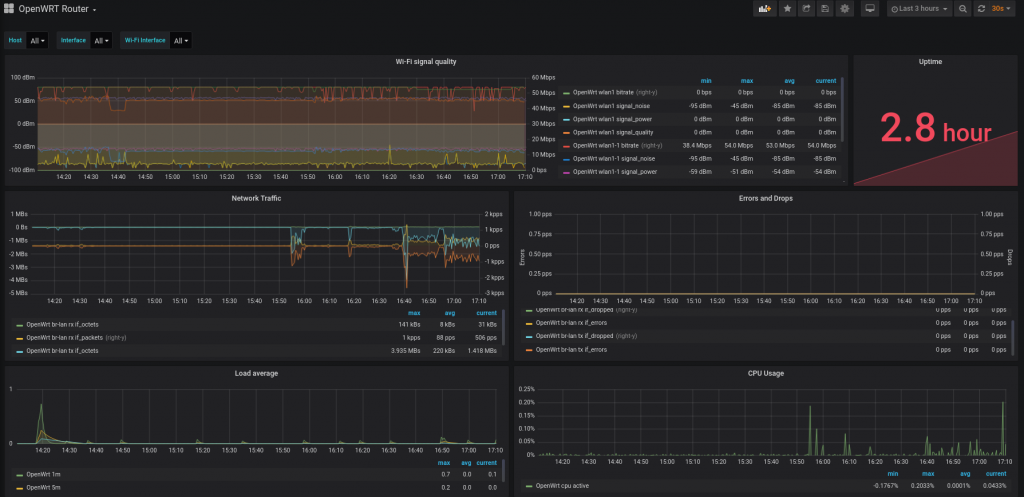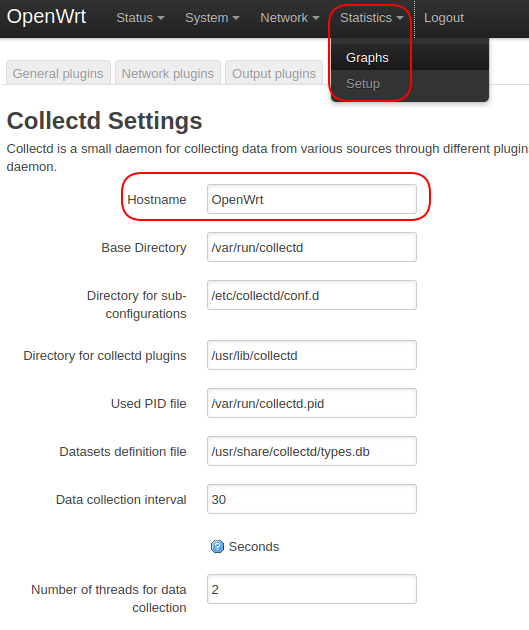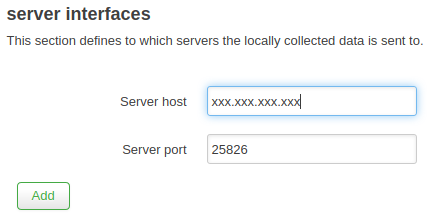
Building on the work of others before me, below you will find a complete tutorial to get OpenWRT logging to InfluxDB using the “connectd” plugin. All required code available on my GitHub.
SSH into your router console: ssh root@xxx.xxx.xxx.xxx and run the below:
opkg update opkg install luci-app-statistics collectd collectd-mod-cpu \ collectd-mod-interface collectd-mod-iwinfo \ collectd-mod-load collectd-mod-memory collectd-mod-network collectd-mod-uptime collectd-mod-thermal collectd-mod-openvpn collectd-mod-dns collectd-mod-wireless /etc/init.d/luci_statistics enable /etc/init.d/collectd enable
Go to router Web Interface and there is a new “Statistics” tab, its mostly setup but quick configuration: (also see screenshot below)
- Go to Statistics -> Setup -> add ‘Hostname’ field and populate it. (doesn’t exist by default for some reason)

- Go to Statistics -> Setup -> Output plugins -> add the details of your InfuxDB server. (leave the port as 25826)

We are finished with the router now, I rebooted it, not sure if was 100% necessary.
Next SSH into your InfluxDB console: ssh xxx@xxx.xxx.xxx.xxx
Create file: /usr/local/share/collectd/types.db (add file from my Github)
sudo nano /usr/local/share/collectd/types.db
We now need to enable the “collectd” plugin in InfluxDB config:
sudo nano /etc/influxdb/influxdb.conf
Configure it so it is the same as below:
[[collectd]] enabled = true bind-address = ":25826" database = "dev_collectd" retention-policy = "" # # The collectd service supports either scanning a directory for multiple types # db files, or specifying a single db file. typesdb = "/usr/local/share/collectd/types.db" # security-level = "none" auth-file = "/etc/collectd/auth_file" # These next lines control how batching works. You should have this enabled # otherwise you could get dropped metrics or poor performance. Batching # will buffer points in memory if you have many coming in. # Flush if this many points get buffered batch-size = 5000 # Number of batches that may be pending in memory batch-pending = 10 # Flush at least this often even if we haven't hit buffer limit batch-timeout = "10s" # UDP Read buffer size, 0 means OS default. UDP listener will fail if set above OS max. read-buffer = 0 # Multi-value plugins can be handled two ways. # "split" will parse and store the multi-value plugin data into separate measurements # "join" will parse and store the multi-value plugin as a single multi-value measurement. # "split" is the default behavior for backward compatibility with previous versions of influxdb. # parse-multivalue-plugin = "split"
Exit & Save.
Add new database in InfluxDB, I carried this out through the Chronograf web interface but add in through the terminal by the below if required:
influx
create database dev_collectd
exit
Restart InfluxDB to activate the new config:
sudo service influxd restart
Now onto Grafana Dash:
Add the “dev_collectd” database to the Grafana Data Sources list.
Next go to “Import dashboard” and paste in the JSON code on my Github. I tweaked a previous dashboard slightly.
All done!
References I used:
https://blog.christophersmart.com/2019/09/09/monitoring-openwrt-with-collectd-influxdb-and-grafana/
https://wiki.opnfv.org/display/fastpath/Installing+and+configuring+InfluxDB+and+Grafana+to+display+metrics+with+collectd
Notes on what doesn’t work:
Can’t see amount of connected wireless devices.
OpenVPN stats also not working.
Its on the to do list if I can get this going again.